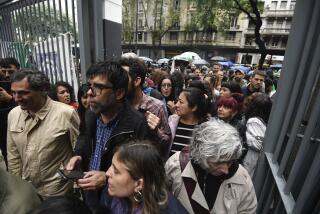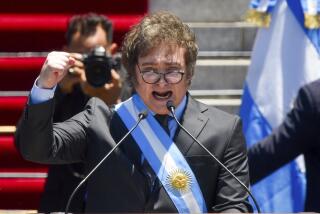Argentina’s policies hinder development of vast oil, gas reserves
BUENOS AIRES — When the Argentine oil company YPF announced two years ago that it had discovered some of the world’s largest reserves of shale gas and oil on a barren plain in Patagonia, many began looking to the energy industry as the answer to Argentina’s financial woes.
The country’s growing dependence on foreign fuel has been a main driver of economic instability. Oil and gas imports have drained currency reserves, and large energy subsidies have contributed to a soaring inflation rate.
According to a U.S. Energy Department report touted by officials and energy analysts, tapping the hydrocarbons buried deep in the so-called Vaca Muerta formation in Patagonia could reverse Argentina’s steady decline in oil and gas production, meeting domestic demand and providing enough for export.
But Argentina’s path to becoming a world energy power is far from clear.
More than a decade after its default on nearly $100 billion in debt in 2002 after a prolonged recession, Argentina is still considered a risky investment. That fact was highlighted this week when President Cristina Fernandez de Kirchner suggested that she would defy a U.S. appeals court’s order to pay more than $1.3 billion to a small group of bond investors who refused to swap out defaulted securities for new, discounted ones, and instead have sued for the original face value.
High taxes, strict currency controls and Fernandez’s sudden move last year to nationalize YPF have also complicated Argentina’s ability to secure the billions of dollars in foreign investment it needs to get new oil and gas wells pumping.
“The policy has been quite erratic in a very short amount of time,” said Ignacio Labaqui, a business consultant who analyzes Argentina. “That conspires against great investments.”
Argentina is a nation of dramatic booms and busts. After the 2002 crisis, which saw a wide swath of the middle class lose much of its savings, the economy grew rapidly, driven by high prices for agricultural exports, such as soybeans.
But a mounting appetite for foreign energy has reduced the supply of dollars that Argentina needs to pay bondholders. Argentina’s reserves dropped from $56 billion in 2011 to $37 billion in 2013, according to the International Monetary Fund. During that time, energy imports grew from $9.4 billion to an estimated $14 billion.
Unable to borrow money on international markets because of past defaults, Fernandez’s government has responded by printing money, fueling inflation. Officially, the inflation rate is 10.5%, but unofficial estimates put it at 25%. The government also has made it more difficult for people to withdraw foreign currency, a blow to a middle class that has traditionally saved money in foreign cash because it is more stable than the fluctuating peso.
As a result, the black market is booming.
One illegal cash-changer in the heart of this city’s busiest shopping district said he ferries dozens of customers daily into a storefront that looks from the outside like a travel agency. Inside two men with calculators and stacks of cash change pesos into dollars at a rate 1.5 times higher than the official government rate.
In an effort to pull black market dollars back into the banking system, Fernandez introduced a tax amnesty plan this year that allows people to turn over undeclared cash in exchange for government bonds without penalty. But tango instructor Mercedes Frassia said she doubted that most people would give up their dollars.
“We just don’t trust the government to protect us,” said Frassia, who lost 50% of her savings in the 2002 crisis.
Still, Frassia supports Fernandez, who has expanded social programs, added more paid holidays and raised taxes on international firms since she succeeded her late husband as president in 2007. When Fernandez announced the seizure of YPF last year, Frassia felt proud.
The company had been in the hands of the state before being privatized in the early 1990s. Fernandez complained that Repsol, the Spanish firm that held a majority stake in YPF, had been too slow to develop Vaca Muerta.
Repsol said Argentina’s price controls on energy exports had made doing business difficult. High export taxes have driven out other energy companies, analysts say, leading to the nation’s decline in oil and gas production.
Repsol accused Argentina of seizing YPF in an attempt to cover up the country’s economic problems, and demanded at least $10 billion in compensation. The firm, which lost almost a fourth of its market value in the month after the nationalization, this summer rejected an estimated $4.5-billion offer made by Argentina.
Fernandez’s government, meanwhile, has been in talks with other international oil and gas companies, promising tax incentives if they invest $1 billion or more over a five-year period.
Last month Fernandez announced an agreement with Chevron to drill as many 1,500 wells at Vaca Muerta. The $1.24-billion agreement was celebrated by her supporters, but analysts say it may face legal roadblocks.
Members of the political opposition have filed an injunction to invalidate the agreement, which they say was approved in secrecy. And drilling can’t begin until the contract is approved by officials in Neuquen province, where Vaca Muerta lies. The project, which will require the controversial process of hydraulic fracturing, also known as fracking, has drawn protests from indigenous groups.
Energy consultant Daniel Gerold said that even with an agreement in place, Vaca Muerta will take five to seven years to fully develop and that the seizure of YPF has made Argentina look even riskier to potential investors. “They came in and robbed them,” Gerold said.
More to Read
Start your day right
Sign up for Essential California for news, features and recommendations from the L.A. Times and beyond in your inbox six days a week.
You may occasionally receive promotional content from the Los Angeles Times.







